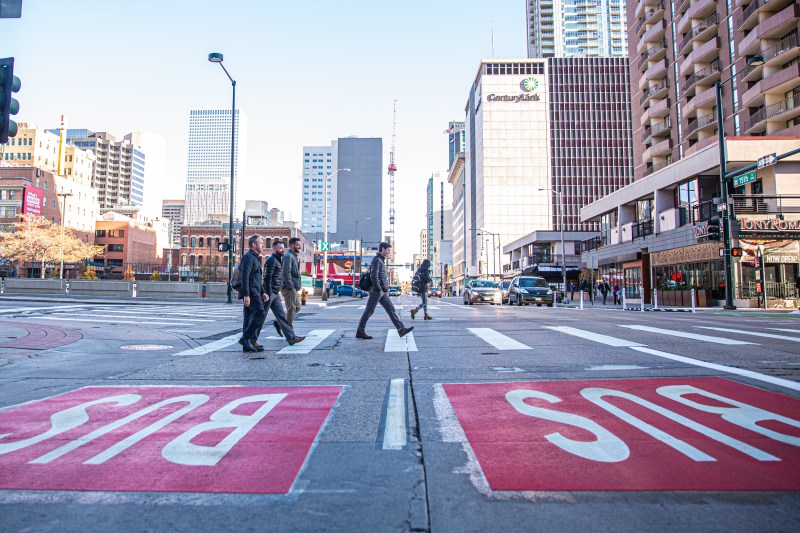Back on Track: What’s Next for the RTD Board of Directors?

This is the final installment of the Streetsblog Denver series covering the RTD Board of Directors. Every Friday, we’ll be looking at the newest updates with RTD and its board members. We’ll explore the issues RTD is facing and the responsibility of the board to address them. Read parts one, two, three, four, five, six, seven, and eight, and nine.
This year, the RTD Board of Directors has been faced with many new challenges. In the face of the pandemic, RTD saw a 70% decrease in ridership, made service cuts, installed plexiglass on buses, and increased cleaning on all vehicles while trying to manage an already damaged budget. Now, the board will be welcoming five new board members while dealing with employee layoffs, budget cuts for 2021, and pressure to secure money for incomplete FasTrack projects.
Dealing with the impacts of COVID-19 will be the board’s biggest hurdle. The impacts of the pandemic have worsened the agency’s financial problems, with ridership down 40% and service running at 60% of pre-pandemic levels. RTD was criticized for ineffective service before the pandemic, with vehicles arriving late and having trips canceled all together due to a lack of operators. Now, buses are being told to by-pass stops if the bus is at capacity, leaving riders waiting at stops for the next scheduled bus.
While there are still people taking public transit, core ridership is not enough for RTD to start making an effective recovery. In a survey of 2,700 people completed earlier this year, residents responded saying they were concerned about traveling by bus or train, and 82% rated transportation as the least safe activity they would participate in, including grocery shopping, visiting a drugstore or pharmacy, visiting friends or family and exercising outside. In order to increase ridership, RTD will need to assure riders that it is safe to return to public transit.
A new study by Sam Schwartz Consulting and commissioned by the American Public Transportation Associates provided new information that shows contracting and spreading COVID-19 on public transportation is highly unlikely. Based in New York, the study examined a total of 150 million rides between June 1 and August 18. The infection rate in the five boroughs dropped from 3.3% to 1% despite an increase in MTA ridership during this time. Similar studies showing the comparable results have been conducted in major cities across the globe.
Last month, the RTD Board of Directors finalized the budget for 2021 which included layoffs for over 350 employees, the elimination of 300 vacant positions, and pay cuts for employees making more than $120,000. In a letter to the board, Governor Polis asked the agency to consider delaying layoffs until there was a decision regarding a second stimulus package for federal transportation. He also expressed hope that the previous stimulus package would be used to help delay the layoffs even further.
According to RTD, the $232 million that was received this summer had to be used in 2020 and was spent to “save hundreds of jobs for months and preserved transit for essential workers.” The Board of Directors acknowledged the governor’s letter but still voted to move forward will budget cuts and layoffs. There is also still no guarantee of a second round of federal money coming to RTD, although new General Manager Deborah Johnson has joined other transit agencies across the country in asking lawmakers and Congress for emergency relief to mitigate the fall in ridership. In total, transit agencies and advocates have asked for $32 billion in relief funding. Currently, the status of the relief package is being considered by congress and would include $15 billion for mass transit.
The new board members will soon complete their onboarding and officially step into their roles as the directors for their districts. In recent months, many of the new members expressed optimism for the agency’s future and believe they’ll bring a fresh perspective to the board. “I’m excited to work with people to bring about better change,” says Director-elect Bobby Dishell. “I’m really excited to dive into these issues and start to change the perception of RTD.”
While it is uncertain what 2021 will bring for RTD and the Board of Directors, it is sure they will have many challenges to overcome. The effects of COVID-19 will be long lasting and felt by all Denverites—not just those who rely on RTD every day. The main challenge facing the RTD Board is to increase ridership and revenue while providing transportation that is safe and equitable for everyone. Despite the overwhelming responsibility that lies ahead, Johnson was optimistic during a forum with Commuting Solutions on December 2. “While these may appear to be challenges, I do believe that these are coupled with opportunities. We just have to be willing to roll up our sleeves and look at what’s before us.”
Share this link with a friend who should get daily walking, biking, and transit news.


